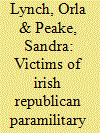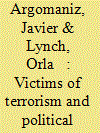|
|
|
Sort Order |
|
|
|
Items / Page
|
|
|
|
|
|
|
| Srl | Item |
| 1 |
ID:
160517


|
|
|
|
|
| Summary/Abstract |
This article attempts to challenge binary notions of “victim” and “perpetrator” categories by taking into account the complex interaction of actors who both participate in, and are impacted by, terrorist violence. Semi-structured interviews were conducted with self-identified Republican (n = 25) and Loyalist (n = 27) ex-prisoners in Northern Ireland who are currently involved in self-described peace initiatives. Results suggest that political ex-prisoners evoke notions of collective victimization as a vehicle to bridge their transition from “paramilitary” to “peace maker” in this context. The implications are discussed in terms of understanding the functionality of collective victimhood for those who controversially adopt the label.
|
|
|
|
|
|
|
|
|
|
|
|
|
|
|
|
| 2 |
ID:
139450


|
|
|
|
|
| Summary/Abstract |
In 2013 Northern Ireland (NI) witnessed the most protracted period of public-disorder ever seen in the United Kingdom. After Belfast City Council voted to fly the Union flag in-line with the manner adopted in the rest of the United Kingdom, loyalist protestors blocked roads, attacked offices, and held marches through Belfast city center. During what became known as Operation Dulcet, police had to respond to the protests and violence, mindful of existing tensions in NI. This article reports on data collected from interviews conducted with officers involved in the policing of these events. The findings demonstrate that the police response was understood using narratives concerning the primacy of human rights, a focus on perceived proportionality, and ultimately, related to the potential violence linked to historic conceptions of community divisions in NI.
|
|
|
|
|
|
|
|
|
|
|
|
|
|
|
|
| 3 |
ID:
156625


|
|
|
|
|
| Summary/Abstract |
While a considerable amount of research has been conducted on community-based initiatives aimed at preventing violence, including the role of the ex-political prisoner community in preventative and counterterrorism work, little is known about how the ex-prisoners themselves manage their identity transition between the role they occupied during the conflict and their current role in violence prevention. We argue that it is important to consider the perspective of ex-prisoners who are both architects of their own process of desistance from political violence, as well active leaders of bespoke desistance programs. While many researchers have recognized the utility of the role of ex-prisoners in violence prevention work, theoretically, the way in which ex-prisoners do violence prevention through their use of language and intergroup contact and other resources, is poorly understood. Ultimately, the aim of the article is twofold: to understand the resources (discursive or otherwise) that the community of ex-political prisoners use in their preventative work and (2) to understand how this community understand their role in desistance programs in the context of their personal involvement in violent conflict, including the ways in which participants manage their identity transition.
|
|
|
|
|
|
|
|
|
|
|
|
|
|
|
|
| 4 |
ID:
148911


|
|
|
|
|
| Summary/Abstract |
Throughout the history of Northern Ireland's (NI) “Troubles,” over 3,800 individuals were killed, with between 40,000 to 100,000 individuals injured, leaving many families and communities struggling with the aftermath. In recent times a particular category of victims and survivors has been politically active and thus featured prominently in the media: “The Disappeared.” This label has come to represent the victims of paramilitary groups whose remains were secretly disposed of. Through a long public and political battle the families of the Disappeared have achieved a measure of political success resulting in the establishment of the Independent Commission for the Location of Victims' Remains (ICLVR). Achieving political voice is not the only or perhaps the most significant difficulty encountered by these families. Their experiences in fact epitomise the complexity of the conflict and divisions in NI society and reflect the dominant issues of loyalty, identity, and importantly—silence. Throughout The Troubles, this silence and related notions of loyalty permeated all levels of society: at a community level which included the response of the church; at a statutory level including the response from social services and police; and, at a political level including local political processes but also departments within the British and Irish governments. This article examines the experiences of the families of the Disappeared through a multilevel analysis of their public campaign seeking the return of the remains of their family members. Using data collected from the families, members of the ICLVR, and support workers, the experience of the families of the Disappeared are analysed through accessing the social dynamics of silence (and loyalty), in-group affiliations, notions of sacrifice, and the attribution of blame; political successes both national and international will also serve to frame the analysis.
|
|
|
|
|
|
|
|
|
|
|
|
|
|
|
|
| 5 |
ID:
152882


|
|
|
|
|
| Summary/Abstract |
Terrorism and political violence exist fundamentally as communicative acts; inherently the acts themselves serve to inspire anxiety and fear. As the recipients of such a communicative act, victims of terrorism and political violence serve as the vehicle for the dissemination of these communications to both the intended and broader audiences. Their victimising experience is thus a complex interplay between a profound personal trauma and the political/communicative dimension of the attack. Given this complexity, this article addresses how victims’ needs are understood by victims of terrorism and political violence in both Northern Ireland (NI) and Great Britain (GB). Through engagement with practitioners, victims, survivors, and community activists, this article conceptualises the existing perceptions amongst these different groups regarding needs, the delivery of services to victims in NI and GB, and examines the origins of the different approaches. Results demonstrate that victims’ needs are highly context-dependent at a public level, but relate heavily to the experiences of other victims of terrorism and political violence at a private level.
|
|
|
|
|
|
|
|
|
|
|
|
|
|
|
|
|
|
|
|
|